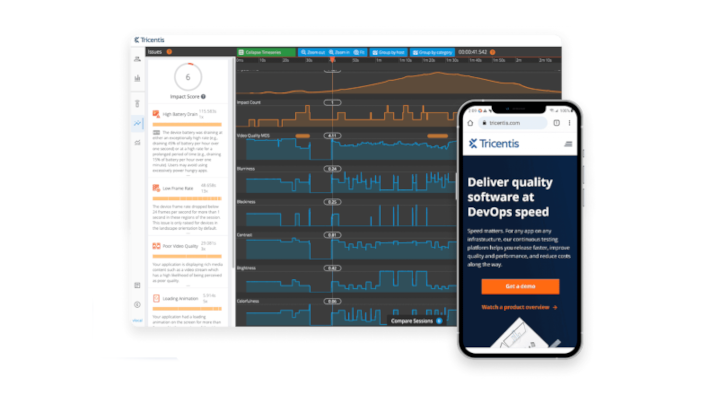 CLOUD
CLOUD
 CLOUD
CLOUD
 CLOUD
CLOUD
Tricentis Inc. today debuted a cloud platform that will enable developers to provision on-demand smartphones and tablets for their mobile app projects.
The platform is known as the Tricentis Device Cloud. Besides access to handsets, it also provides an artificial intelligence engine that promises to streamline certain app development tasks.
Austin-based Tricentis provides software tools that companies use to test their apps for usability issues before releasing them. Historically, testing an app required developers to manually evaluate each of its interface sections by simulating user interactions. Tricentis’ tools automate the task to save time.
The startup is backed by about $172 million in funding from Insight Partners and other investors. It claims to have more than 2,500 customers, including Dell Technologies Inc., Applied Materials Inc. and other tech firms.
Because mobile devices vary significantly in their design, testing an app on one handset is not enough to ensure it will work well for every user. Software teams must test their apps on upwards of dozens of different smartphones. Historically, that required companies to maintain a large collection of in-house handsets, which is time-consuming and expensive.
The new Tricentis Device Cloud is designed to provide a more convenient alternative. According to Tricentis, the platform removes the need for companies to maintain their own in-house device collections. Instead, developers can provision cloud-based smartphones and tablets through a web interface.
The Tricentis Device Cloud offers access to smartphones from more than a half dozen manufacturers including Apple Inc., Samsung Electronics Co. Ltd. and Google LLC. Tablets are available as well. Developers can optionally provision devices in multiple locations to test whether an app’s user experience fluctuates across regions.
In some software projects, the Tricentis Device Cloud could potentially substitute not only in-house device fleets but also simulation and emulation tools. Such tools allow developers to create a virtual handset on their workstations.
Virtual devices are widely used for software testing because they cost less than buying and maintaining a collection of physical smartphones. However, the technology provides more limited capabilities than a physical handset. In particular, virtual devices created with a simulation or emulation tool usually provide less accurate diagnostics data.
The on-demand handsets that Tricentis Device Cloud provides are equipped with a software tool called Mobile AI. According to Tricentis, it’s a machine learning engine that can automatically collect diagnostics data about the app a development team is testing. Mobile AI then uses the collected data to identify areas for improvement.
The company says the engine can detect if an app takes too much time to launch or experiences slow networking speeds. It also identifies more subtle issues, such as cases where a mobile app may have unnecessary interface sections. Overall, mobile AI tracks more than 130 metrics during app tests.
“Tricentis Device Cloud is another key piece of technology supporting our commitment to help organizations innovate on high-quality mobile apps faster,” said Mav Turner, Tricentis’ chief technology officer for DevOps.
Device Cloud is rolling out about two months after the startup made another addition to its product portfolio. In early July, it acquired Waldo, a venture-backed provider of mobile testing software. Through the acquisition, Tricentis gained a software tool that enables developers to create automated workflows for testing mobile apps’ usability.
Support our mission to keep content open and free by engaging with theCUBE community. Join theCUBE’s Alumni Trust Network, where technology leaders connect, share intelligence and create opportunities.
Founded by tech visionaries John Furrier and Dave Vellante, SiliconANGLE Media has built a dynamic ecosystem of industry-leading digital media brands that reach 15+ million elite tech professionals. Our new proprietary theCUBE AI Video Cloud is breaking ground in audience interaction, leveraging theCUBEai.com neural network to help technology companies make data-driven decisions and stay at the forefront of industry conversations.